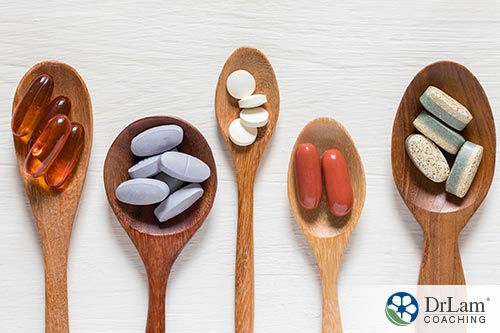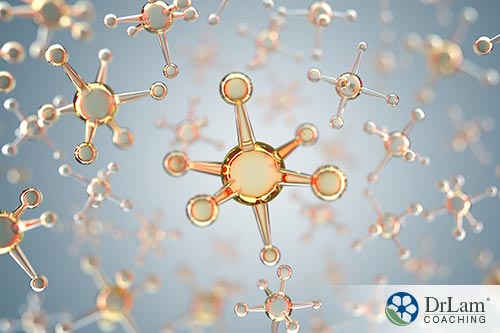 Do you ever have the blues? You know the feeling when you just feel down but don’t know why? You are not alone. According to estimations, over 20 million Americans have some form of mood disorder while over 40 million suffer from anxiety. Vitamins for mood swings may help with this situation.
Do you ever have the blues? You know the feeling when you just feel down but don’t know why? You are not alone. According to estimations, over 20 million Americans have some form of mood disorder while over 40 million suffer from anxiety. Vitamins for mood swings may help with this situation.
Numerous vitamins for mood swings may combat anxiety and depression. According to studies, this may be due to deficiencies. By supplementing your diet with these vitamins for mood swings, you may help yourself with these conditions and support adrenal health at the same time.
Studies show that a sufficient intake of vitamin C corresponds with a reduction in anxiety and depression. Your body cannot make or store this vitamin. This means you need to regularly consume vitamin C either through your diet or via a supplement such as LipoNano C or Adrenal Support.
Besides its role in mental health, vitamin C also helps with your body’s healing process and plays a role in the blood vessels, bone, cartilage, and muscle formation. Vitamin C is also an antioxidant that fights free radicals that cause, amongst others, cancer, and heart disease. Lastly, your body needs vitamin C to absorb iron.
Great food sources of vitamin C include citrus fruits, berries, peppers, and leafy green vegetables. Too much vitamin C may cause stomach disorders.
Around ten percent of women and two percent of men may have an iron deficiency. Symptoms of an iron deficiency include fatigue, anxiety, irritability, and lack of concentration. Ideally, you should break up your iron supplements into two to three small doses per day. Taking one large dose could leave you with constipation.
Food sources with high iron content include organ meat like liver, as well as lean animal protein, milk, pulses, and leafy green vegetables.
A magnesium bath may help to relax you and help soothe tense muscles. A magnesium supplement like Mag Three may also help with brain hormone health because it helps serotonin production. Serotonin is your brain’s ‘feel-good’ hormone. A magnesium supplement may thus help with stress management and address mood swings and depression.
Foods with a high magnesium content include avocado, leafy green vegetables like spinach, black beans, and almonds.
Be careful of taking too large doses of supplemental magnesium because it could have serious side effects. These include low blood pressure, an irregular heartbeat, slowed breathing, and confusion, amongst others.
 The B vitamins for mood swings help balance your brain’s natural chemicals that act as neurotransmitters between brain cells and other parts of your body. The neurotransmitters they particularly focus on are serotonin, norepinephrine, and dopamine. These vitamins are good for adrenal fatigue sufferers as they support adrenal health.
The B vitamins for mood swings help balance your brain’s natural chemicals that act as neurotransmitters between brain cells and other parts of your body. The neurotransmitters they particularly focus on are serotonin, norepinephrine, and dopamine. These vitamins are good for adrenal fatigue sufferers as they support adrenal health.
B Complex vitamins for mood swings to take particular note of include:
Vitamin B3 plays a role in serotonin production, thereby enabling your brain’s neurotransmitters to communicate with the other cells in your nervous system. Therefore, low vitamin B3 levels could harm your mood. Too much vitamin B3 may cause a variety of symptoms that include itching, nausea, a rapid heartbeat, diarrhea, and abdominal pain.
Good food sources of vitamin B3 include lean beef, tuna, salmon, poultry, legumes, seeds, and leafy green vegetables.
Vitamin B6 plays an important role in various physical as well as psychological functions in your body. One of these is the neurotransmitter function. Low vitamin B6 levels, associated with depression, may result in a hormonal imbalance resulting in depression. Good natural sources of vitamin B6 include whole-grain cereals, eggs, fish, poultry, and vegetables.
Please beware of taking high vitamin B6 concentrations for any length of time because it could result in nerve damage, sensitivity to sunlight, heartburn, and nausea, amongst others.
Besides playing a role in preventing miscarriage and birth defects, vitamin B9 may help protect against heart disease, stroke, and even certain types of cancer. It may also be one of the vitamins for mood swings because, together with vitamin B6 and vitamin B12, folic acid may help break down homocysteine, an amino acid. High levels of this amino acid may be associated with depression and Alzheimer’s disease. This vitamin also plays a role in serotonin synthesis which plays a role in mood regulation. Great food choices high in vitamin B9 include beans, citrus fruits, and leafy green vegetables.
Taking high doses of folic acid in a supplement form may cause sleeping troubles, skin issues, and stomach problems.
Studies indicate that taking a vitamin B12 supplement may reduce your risk of depression. Also, together with vitamin B6 and folic acid, it helps with the breakdown of homocysteine. Please note the breakdown of homocysteine results in the generation of S-adenosyl-L-methionine (SAMe). SAMe is found in your brain cells and may play a role in depression. Good food sources of vitamin B12 include soft cheeses like feta cheese and cottage cheese, sardines, mackerel, eggs, and leaf beef and lamb.
Vitamin B12 supplements could interact with certain medications. No oral threshold has been established for vitamin B12 due to its very low toxicity and your body usually being able to excrete what it does not use via your urine. A large dose of this vitamin via an injection could, however, result in an acne or rosacea outbreak.
Although your body naturally manufactures vitamin D when exposed to sunlight, much evidence suggests that many Americans have a deficiency. While vitamin D helps keep teeth and bones healthy by promoting calcium absorption, it may also be one of the vitamins for mood swings.
Studies found that a vitamin D supplement such as D3K2 may significantly reduce your chances of depression. Your brain has many vitamin D receptors. This may indicate that the vitamin plays a role in cognitive function. Foods high in vitamin D include fatty fish, e.g. tuna, salmon, and mackerel, cheese, eggs, and beef liver.
Although rare, high vitamin D levels in your body could become toxic. Symptoms associated with too much vitamin D include weakness, nausea, and vomiting. You could also experience kidney problems while kidney stone formation is not out of the question.
This amino acid is a precursor to serotonin. When serotonin levels are low, a 5HTP supplement like HTPro may increase your serotonin levels. High doses of 5-HTP could lead to nausea, vomiting, stomach pain, and diarrhea.
 Omega-3 fatty acids play an important role with regards to brain chemistry and improve serotonin effectiveness. They play an important role in the transmission of chemical messengers.
Omega-3 fatty acids play an important role with regards to brain chemistry and improve serotonin effectiveness. They play an important role in the transmission of chemical messengers.
Good sources of omega-3 fatty acids include fatty fish like salmon, herring, and mackerel. Nuts and seeds are also good omega-3 food choices. Fish oil supplements like Liquid OM-3 are another good choice. Do remember, though, that high concentrations of fish oil or fatty fish could lead to certain health issues like blood sugar imbalances.
Although our bodies only need very small amounts of chromium to function correctly, studies show that up to 50% of the American population may have a deficiency and could benefit from taking a supplement such as Chromaster. Yet studies show that chromium helps with blood sugar control and helps regulate serotonin and melatonin production and function. In so doing, it helps with mood regulation. Natural sources of chromium include potatoes and animal protein.
Please take note that high levels of chromium in your body could lead to blood sugar issues, stomach problems, and cause liver damage.
L-theanine is an amino acid that boosts your brain’s alpha waves, encourages an increase in serotonin levels, and triggers the release of gamma-aminobutyric acid (GABA). Gaba plays an important role in calming your brain’s neurotransmitters. In doing so, it reduces anxiety levels and helps stabilize mood. It is also a powerful antioxidant.
Green tea is a good source of this amino acid. Taken in high doses, theanine may promote sleep, so be careful if you intend driving as you could fall asleep behind the wheel and cause an accident.
According to studies, St John’s Wort is considered a natural antidepressant because it may exhibit the same type of interaction with your brain as certain antidepressants. It could cause issues when taking it with certain prescription medications, however, such as anti-cholesterol and blood-thinning drugs.
According to research, passionflower, a plant native to Peru, may help address stress and other related issues. This may be because it boosts the GABA in your brain. Although generally considered safe, passionflower has some known side effects such as sleepiness, dizziness, and confusion.
Studies on Rhodiola show that it may support both mental and physical performance. It may also help with anxiety and depression. Rhodiola may also improve stress-related issues like exhaustion and burnout.
Please note that taking too much Rhodiola may have the opposite effect and promote anxiety in some people.
Vitamins for mood swings may benefit your Neuroaffect Circuit and its function. As such, your Neuroaffect Circuit plays a role in your body’s NeuroEndoMetabolic (NEM) Stress Response and is a biological component of various mental health issues. But because it plays an integral part in so many bodily functions, a healthy Neuroaffect Circuit that implies healthy brain function is extremely important for not only your mental but also physical health.
One of the main causes of mental issues is stress. Stress may cause a hormonal imbalance in the brain because of the high cortisol production associated with it. Your hormones in the brain, to a large extent, are the neurotransmitters used by the brain to send instructions to your various organs and other body structures. An imbalance could lead to various mental health issues including anxiety and depression, amongst others.
The various vitamins for mood swings mentioned all play a supportive role regarding hormone production and brain health. Using these supplements may help you cope in the short term while supporting brain health in the long run.
Mood swings may disrupt your life and cause various issues, both in your home and work environments. Vitamins for mood swings may help your work through this.
If you are suffering from mood swings, here are some things you can do.

If you would like to know more about or need assistance with vitamins for mood swings, the team at Dr. Lam Coaching can help. We offer a free** no-obligation phone consultation at +1 (626) 571-1234 where we will privately discuss your symptoms and options. You can also send us a question through our Ask The Doctor system by clicking here.
Vitamins for mood swings may help with depression and other psychiatric health issues, according to various studies. Most of these support brain function and strive at correcting a hormone imbalance. In so doing, they may also offer adrenal support due to their hormonal support function.
